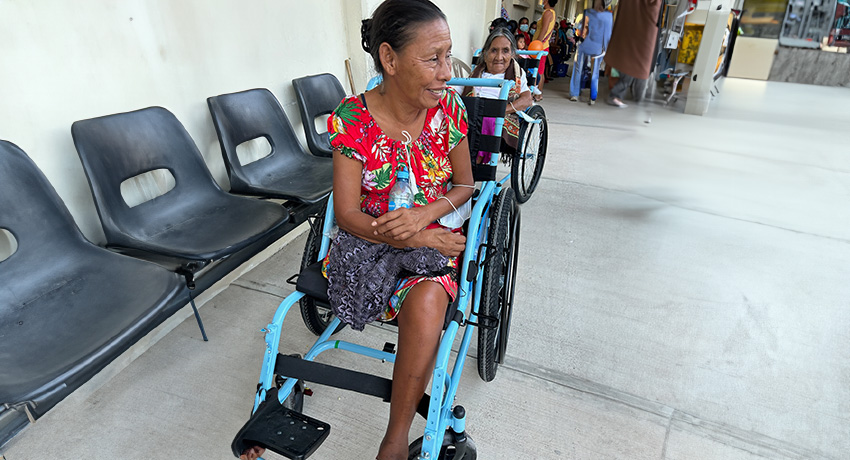Serving on medical mission trips in Guatemala for 18 years has impacted Twyla Brack’s work as a medical assistant with UT Physicians. These experiences have made her more conscious of the many advantages available to health care workers and patients in the United States. Building wheelchairs, setting up and staffing a clinic, and serving as a medical interpreter are just a few of the critical services provided on a trip to Guatemala in March 2024.
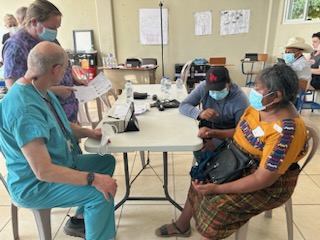
Serving with heart
For the past two decades, Philip C. Johnson III, MD, an internal medicine physician, has dedicated his leadership, time, and expertise to these Guatemalan mission trips. Together with colleagues and medical students, they give much-needed care to underserved communities. These trips have become a cornerstone for Johnson and his wife, Linda, who is the team administrator.
Houston-based Faith in Practice reached out to partner with Johnson years ago. The 30-year-old nonprofit organizes more than 50 trips each year with various teams and leaders nationwide. The March 2024 team, named “Johnson I Medical Clinic 801,” consisted of six UTHealth Houston employees and others from Texas, Illinois, Washington, Nevada, Kentucky, Minnesota, California, Oregon, and beyond.
“I always tell teams on the last day that the good news is they’ve experienced patients’ kindness, openness, and gratitude, and the bad news is now that they’ve experienced it, they have to deal with it when they return to the United States,” said Johnson, professor and Jerold B. Katz Family Distinguished Professor in General Internal Medicine, and Carolyn and William T. Deffebach Distinguished Professor at UTHealth Houston.
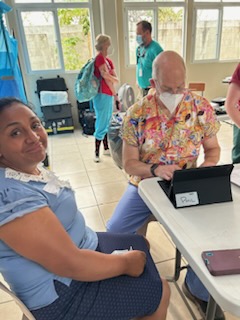
Johnson said that sometimes that’s harder to do personally. For him, it meant he wanted to return repeatedly to help. He’s been going to Guatemala on and off for the last 55 years for different reasons. He has taken medical students to other areas but says it’s not the same. He believes the culture of the indigenous people of Guatemala puts a whole different spin on experience.
“Maybe it’s the gentleness of the people and how they’re able to persevere despite their problems,” Johnson said.
Learning outside the classroom
Robin L. Hardwicke, PhD, a primary care provider and HIV medicine specialist, also has volunteered in Guatemala for 18 years with Johnson, Brack, and Faith in Practice. The most compelling aspect of her experience is joining UTHealth Houston attendings and residents over the years in this life-changing work.
“We experience a much different idea of medicine, and nursing for that matter, in Guatemala that can’t be learned through the training and care in Houston or the United States,” said Hardwicke, professor of internal medicine at McGovern Medical School and adjunct professor at Cizik School of Nursing at UTHealth Houston. “The human expression is much different in the U.S., while those in the rest of the world are struggling for basic needs but doing it with grace, a smile, and love without complaint.”
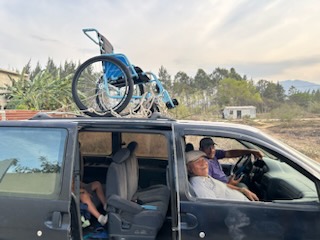
Staffing a medical mission
A typical mission week begins with a flight from Houston to Guatemala, followed by a drive to Antigua, where the team spends the night. On Sunday, they travel to the work site and set up a clinic, often in a school or municipal building. This requires unloading two large trucks filled with patient tables, wheelchair pieces, contents of a kitchen, and more.
The team staffs the clinic from Monday to Thursday, seeing patients from 8 a.m.-4 p.m. Each day starts early with a 45-minute drive to the clinic. The team works tirelessly, only taking a break for lunch. They see around 1,200 patients during the week, with approximately 200 to 300 referred for surgery at a later date.
Building local collaboration
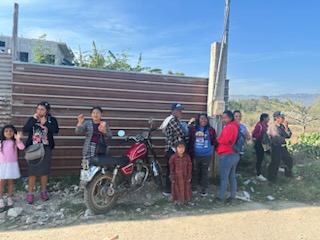
A unique aspect of these missions is collaborating with local volunteers, many of whom are former patients. These volunteers are crucial in identifying patients in rural areas who need medical attention and accompanying them to clinics and hospitals. This direct support is vital.
“Someone from a small community in rural Guatemala isn’t going to be used to going into the big city and to the hospital,” Johnson said.
Over time, Faith in Practice wants to train more volunteers and make a portion of them into community health workers. Johnson said they’ve almost achieved that goal.
“Our hope is that we’ll have the full spectrum of care from identifying the patient, referring them for their needs, and then back to their communities,” he said. “This is an aspect of Faith in Practice that is uncommon in many medical mission efforts. Like UT Physicians, Faith in Practice wants to provide comprehensive patient care.”
Saying yes again and again
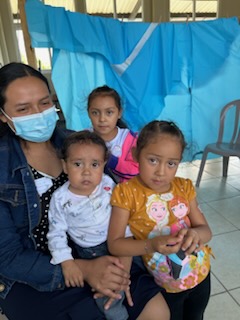
What brings Brack back, year after year, for 18 years? The joy she sees in each patient and their family when the American team reaches their community.
“It’s priceless to hear the laughter, smile, and even the shyness from the older adults as we prepare to provide care,” Brack said. “I also enjoy listening to patients and work to understand their needs.”
Brack also loves the opportunity to live and volunteer with other university employees for a week each year. “It’s like a family reunion with many of us on the Johnson team,” Brack said. “Some of us have been serving together for 18 years. We take pride on our last day taking our UT picture.”
Hardwicke believes universities have a great opportunity with these trips and should encourage this type of training for both medical and nursing students. “It will ultimately make the learner that much more empathetic to patient-care needs,” she said.
Endearing trip highlight
One story that sticks out in Johnson’s mind from the recent mission trip is a young boy with cerebral palsy. His mom, who barely weighed 90 pounds, was experiencing health problems from carrying her 60-pound son. The team built a wheelchair for the boy, and Johnson said the outcome was amazing.

“It’s just completely different for these families to be able to wheel them around,” Johnson said. “The addition of the wheelchair program has been the biggest surprise in recent years.”
The team has been putting together 100 wheelchairs on the premises each trip for several years. They give them to people with mobility challenges. Free Wheelchair Mission provides free wheelchair kits, and Faith in Practice covers the shipping to Guatemala.
“I’m always energized professionally by the experience because you care for people with the same problems, and they’re very appreciative,” Johnson said. “You go to help these people, but in the process, you’re helped much more yourself.”
Adapting to changing needs
As a developing country, many equate a medical mission trip to treating patients with parasites or specific infections. Johnson said people in Guatemala have muscle aches, respiratory infections, breathing problems, and chronic conditions similar to patients in the U.S.
Health care needs in Guatemala have evolved over the years, Johnson said. Today, they see more hypertension and diabetes than 20 years ago. He equates this to an improved lifestyle that also encourages people to eat less healthy food.
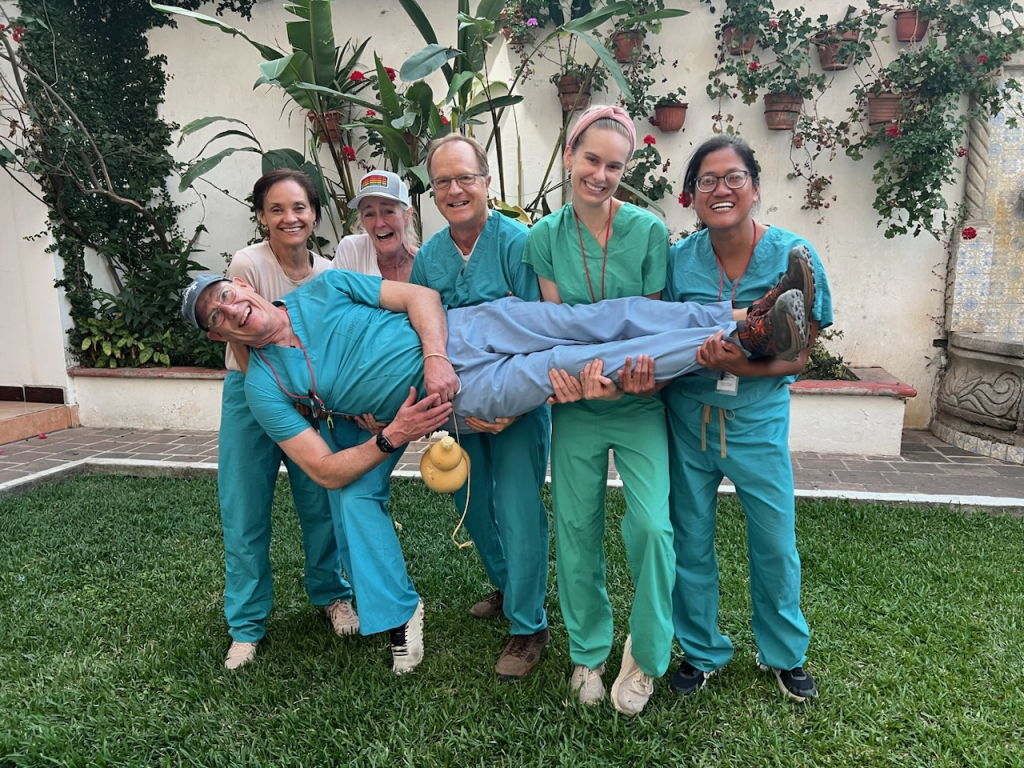
Looking ahead
The collective efforts of volunteers highlight the profound impact of medical missions – for those volunteering and the recipients.
These trips not only provide essential health care but also foster a sense of community and hope among the people of Guatemala.
Johnson said people always say that the name “Faith in Practice” sounds like the team is going to bring faith to the people of Guatemala. “No, we go taking our medicine, and we will leave with the faith that they show us,” Johnson said. “It really is a life-changing mission.”

